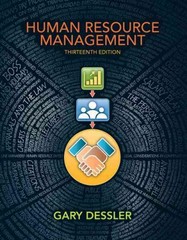1. What would be the advantages and disadvantages to Jennifer s company of routinely administering honesty tests...
Question:
1. What would be the advantages and disadvantages to Jennifer s company of routinely administering honesty tests to all its employees? Jennifer Carter, of the Carter Cleaning Centers, and her father have what the latter describes as an easy but hard job when it comes to screening job applicants. It is easy because for two important jobs the people who actually do the pressing and those who do the cleaning/spotting the applicants are easily screened with about 20 minutes of on-the-job testing. As with typists, Jennifer points out, Applicants either know how to press clothes fast enough or how to use cleaning chemicals and machines, or they don t, and we find out very quickly by just trying them out on the job. On the other hand, applicant screening for the stores can also be frustratingly hard because of the nature of some of the other qualities that Jennifer would like to screen for. Two of the most critical problems facing her company are employee turnover and employee honesty.
Jennifer and her father sorely need to implement practices that will reduce the rate of employee turnover. If there is a way to do this through employee testing and screening techniques, Jennifer would like to know about it because of the management time and money that are now being wasted by the never-ending need to recruit and hire new employees.Of even greater concern to Jennifer and her father is the need to institute new practices to screen out those employees who may be predisposed to steal from the company.
Employee theft is an enormous problem for the Carter Cleaning Centers, and one that is not limited to employees who handle the cash. For example, the cleaner/spotter and/or the presser often open the store themselves,without a manager present, to get the day s work started, and it is not unusual to have one or more of these people steal supplies or run a route. Running a route means that an employee canvasses his or her neighborhood to pick up people s clothes for cleaning and then secretly cleans and presses them in the Carter store, using the company s supplies, gas, and power. It would also not be unusual for an unsupervised person (or his or her supervisor, for that matter) to accept a 1-hour rush order for cleaning or laundering, quickly clean and press the item, and return it to the customer for payment without making out a proper ticket for the item posting the sale. The money, of course, goes into the worker s pocket instead of into the cash register.
Step by Step Answer:







